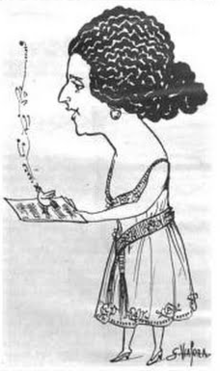Nina Morgana


Nina Morgana (November 15, 1891 — July 8, 1986) was an Italian-American soprano, a protegée of Enrico Caruso, who sang with the Metropolitan Opera for fifteen seasons, from 1920 to 1935.
Early life
Nina Morgana born and raised in Buffalo, New York,[1][2] the daughter of Sicilian immigrants Calogero (Charles) and Concetta Morgana.[3] She was a child performer in the "Venice in America" exhibit[4] at the Pan-American Exposition in 1901.[5] In 1906, she sang at a concert in Buffalo to benefit the survivors of the San Francisco earthquake that year.[6] With encouragement from Enrico Caruso, she studied voice in Milan with Teresa Arkel from 1909 to 1913.[7]
Her brother Dante J. Morgana was a prominent eye surgeon based in Buffalo.[8]
Career
During her time training in Italy, she appeared in the premiere of Der Rosenkavalier at La Scala in 1911.[3] Nina Morgana toured with Enrico Caruso in the 1910s.[3] She was with the Chicago Opera in the 1919-1920 season.[9][10] She sang with the Metropolitan Opera from 1920 to 1935, starting with playing "Gilda" in Rigoletto.[7] Her other best-known roles were "Nedda" in Pagliacci, "Musetta" in La bohème, and "Micaela" in Carmen.[3] She also gave concerts, including live radio concerts.[11]
In 1926 Morgana sued Chadwick Pictures for a silent film called The Midnight Girl (1925), in which a singer character named "Nina Morgana" is portrayed by actress Dolores Cassinelli as "debauched" and "passé".[12]
Personal life
Nina Morgana married Bruno Zirato, Caruso's assistant.[13] Caruso was scheduled to be the best man at their 1921 wedding, just weeks before he died.[14] Bruno Zirato died in 1972;[15] Nina Morgana died in Ithaca, New York in 1986, aged 94 years, survived by her son, Bruno Zirato Jr.[7][5]
References
- ↑ "Nina Morgana" Pan-American Exposition 1901 (University at Buffalo Libraries).
- ↑ "Nina Morgana, Opera Star, Comes Home to Buffalo After Triumph on Stage" Buffalo Courier (May 18, 1924): 89. via Newspapers.com

- 1 2 3 4 "The James A. Drake Interviews: Nina Morgana" Mainspring Press blog (April 20, 2018).
- ↑ "Nina Morgana ('Little Patti', 'Baby Patti')" Pan-American Women exhibit, University at Buffalo Libraries.
- 1 2 "Nina Morgana, Singer, Toured with Caruso" New York Times (July 11, 1986): 18.
- ↑ "A Prima Donna at 20" San Francisco Call (April 13, 1913): 6. via Newspapers.com

- 1 2 3 "Nina Morgana; Diva Who Sang with Caruso" Los Angeles Times (July 12, 1986).
- ↑ Merton's correspondence with Dante J. Morgana, Thomas Merton Center at Bellarmine University.
- ↑ James A. Drake, Rosa Ponselle: A Centenary Biography (Hal Leonard Corporation 1997): 201-206. ISBN 9781574670196
- ↑ "'Earnest Work' – Nina Morgana's Slogan" Musical Courier (July 31, 1919): 12.
- ↑ "Atwater Kent Guest Artists on Air Tonight" Decatur Herald (January 13, 1929): 13. via Newspapers.com

- ↑ "Nina Morgana Avers Film Hurt Name; Seeks $25,000" Daily News (January 25, 1926): 6. via Newspapers.com

- ↑ "Metropolitan Soprano Becomes Bride of Caruso's Secretary" Musical America (June 25, 1921): 3.
- ↑ Viola Brothers Shore, "Nina Morgana, Successful Metropolitan Opera House Star" Musical Observer (July 1922): 4.
- ↑ "Bruno Zirato, 88, Caruso Aide Who Headed Philharmonic, Dies" New York Times (November 30, 1972).
External links
- Nina Morgana Zirato's gravesite, on Find a Grave.
- Two 1920 recordings of Nina Morgana for the Victor Talking Machine Company; Discography of American Historical Recordings, University of California at Santa Barbara Libraries.
- A 1915 photograph of Nina Morgana, in the Bain News Service photograph collection, Library of Congress.
- A 1926 portrait of Nina Morgana by Nickolas Muray, from Condé Nast.